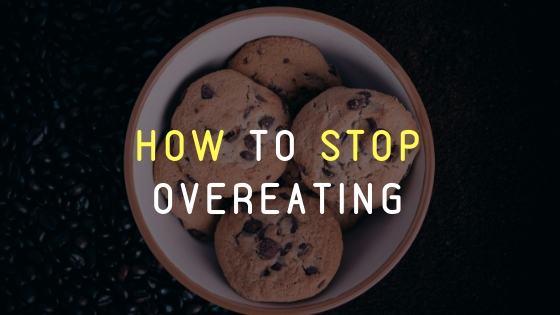My boyfriend eats too much, a friend of mine told me this.
Eating too much in one sitting or taking in too many calories throughout the day are common habits that can be hard to break.
 Over time, eating too much food can lead to weight gain.
Over time, eating too much food can lead to weight gain.
Plus, it can hold you back from reaching your health and wellness goals and may negatively impact your emotional well-being.
Although breaking the cycle of overeating can be challenging, there are ways to kick this unhealthy habit for good.
Here are three tips to avoid overeating at meals.
(Psst, turn these into habits and ditch the willpower!)
Tip #1: Start with some water
When your stomach is growling and you smell amazingly delicious food it’s too easy to fill a plate (or grab some samples with your bare hands) and dive into the food.
But did you know that it’s possible to sometimes confuse the feeling of thirst with that of hunger? Your stomach may actually be craving a big glass of water rather than a feast.
Some studies have shown that drinking a glass or two of water before a meal can help reduce the amount of food eaten. And this super-simple tip may even help with weight loss (…just sayin’).
Not only will the water start to fill up your stomach before you get to the buffet, leaving less room for the feast but drinking enough water has been shown to slightly increase your metabolism.
Win-win!
Tip #2: Try eating “mindfully”
You’ve heard of mindfulness but have you applied that to your eating habits?
This can totally help you avoid overeating as well as having the added bonus of helping your digestion.
Just as being mindful when you meditate helps to focus your attention on your breathing and the present moment being mindful when you eat helps to focus your attention on your meal.
Do this by taking smaller bites, eating more slowly, chewing more thoroughly, and savoring every mouthful. Notice and appreciate the smell, taste and texture. Breathe.
This can help prevent overeating because eating slower often means eating less.
When you eat quickly you can easily overeat because it takes about 20 minutes for your brain to know that your stomach is full.
So take your time, pay attention to your food and enjoy every bite.
Bonus points: Eat at a table (not in front of the screen), off of a small plate, and put your fork down between bites.
Tip #3: Start with the salad
You may be yearning for that rich, creamy main dish.
But don’t start there.
(Don’t worry, you can have some…just after you’ve eaten your salad).
Veggies are a great way to start any meal because they’re full of not only vitamins, minerals, antioxidants, and health-promoting phytochemicals but they also have some secret satiety weapons: fiber and water.
Fiber and water are known to help fill you up and make you feel fuller. They’re “satiating”.
And these secret weapons are great to have on your side when you’re about to indulge in a large meal.
Conclusion:
No matter how strong you are, in front of that food we all do that mistake.
Overeating is normal for many people.
But normal doesn’t support us with weight loss.
So the only solution for overeating is to trick your body.
How often you overeat?
References:
https://authoritynutrition.com/7-health-benefits-of-water/
http://summertomato.com/the-science-behind-mindful-eating-what-happens-to-your-body-during-a-mindful-meal


